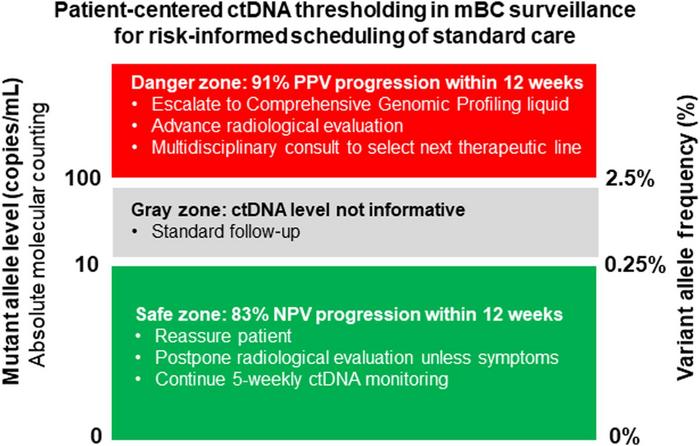In recent advances in oncology, researchers have unveiled a promising approach to the monitoring of metastatic breast cancer using circulating tumor DNA (ctDNA). This paradigm shift, evident in a groundbreaking study published in The Journal of Molecular Diagnostics, reveals how absolute ctDNA concentration thresholds can serve as vital indicators in ruling out or predicting cancer progression. The dual threshold model introduced in this research offers a new avenue for personalized treatment strategies and enhances the precision of cancer surveillance.
The lead investigator of the study, Dr. Geert A. Martens, MD, PhD, from AZ Delta General Hospital and Ghent University in Belgium, elucidates the current challenges faced in monitoring cancer progression. Traditionally, oncologists have relied heavily on medical imaging and vague biomarkers like CA15-3, which lack specificity and sensitivity. The researchers propose that monitoring tumor-specific mutations through a method known as ‘liquid biopsy’ provides a more accurate and timely reflection of the disease status, thus fostering better clinical decision-making.
Over the course of two years, the team analyzed blood samples from patients with advanced breast cancer at five-week intervals, meticulously measuring ctDNA levels. Their methodology incorporated advanced techniques such as targeted deep sequencing and digital PCR, both of which exhibited a remarkable correlation. The researchers emphasized that while the choice of methodology may depend on logistical factors, the underlying message is clear: regular monitoring of ctDNA can significantly improve patient outcomes.
Dr. Martens articulated the significance of their findings, underscoring that their dual threshold classifier is capable of providing decisive results in a striking 90% of blood draws. Notably, ctDNA levels falling below 10 mutant copies/mL indicate a reassuring prognosis, suggesting that cancer progression is unlikely. Conversely, levels surpassing 100 copies/mL are strongly associated with an impending progression, thus positioning this method as a potential game-changer in oncological practices.
The study’s findings extend beyond breast cancer; they also affirm the applicability of the established ctDNA thresholds in the surveillance of metastatic non-small cell lung cancer patients. Dr. Martens emphasized the versatility of their statistical framework, which can be replicated across various datasets with recorded progression outcomes, thus encouraging broader application of this research.
A critical aspect of the research highlights the potential for ctDNA concentration to guide the scheduling of cancer care. The team envisions a future where clinicians can make informed decisions based on real-time ctDNA measurements, significantly enhancing personalized treatment regimens. By harnessing the power of molecular diagnostics, oncologists could prioritize interventions and adjust treatment plans according to individual patient responses and disease trajectories.
As the medical community grapples with the complexities of metastatic cancer management, the introduction of a ctDNA concentration-guided care model represents a significant step toward optimizing therapeutic strategies. By embracing this approach, healthcare providers could facilitate the identification of minimal residual disease and foster recurring assessments that adapt to the patient’s evolving clinical profile.
Moreover, this breakthrough could alter the patient experience by reducing the burden of traditional cancer monitoring methods. Patients would benefit from fewer invasive procedures and a more tailored approach to their treatment, allowing for improved emotional and psychological well-being. With the potential for reduced hospital visits and enhanced surveillance, the implementation of ctDNA monitoring could redefine patient engagement in their care.
In conclusion, the research led by Dr. Geert A. Martens and his team underscores the instrumental role of ctDNA in enhancing cancer surveillance and management. By establishing clear concentration thresholds, they have opened avenues for improved predictive capability, allowing clinicians to navigate the complexities of metastatic cancer with greater confidence and precision. This innovative approach heralds a new era in oncological practice, emphasizing the importance of personalized medicine in optimizing patient outcomes.
Subject of Research: Cells
Article Title: Surveillance of Disease Progression in Metastatic Breast Cancer by Molecular Counting of Circulating Tumor DNA Using Plasma-SeqSensei Breast Cancer in Vitro Diagnostics Assay
News Publication Date: February 24, 2025
Web References: https://doi.org/10.1016/j.jmoldx.2024.08.011
References: [As referenced in the article]
Image Credits: Credit: The Journal of Molecular Diagnostics
Keywords: circulating tumor DNA, metastatic breast cancer, dual threshold model, liquid biopsy, personalized treatment, cancer surveillance, digital PCR, medical imaging, biomarkers, non-small cell lung cancer, molecular diagnostics.
Tags: cancer biomarkers specificitycancer progression predictioncirculating tumor DNA assessmentctDNA concentration thresholdsdigital PCR applications in cancerdisease surveillance advancementsliquid biopsy techniquesmetastatic breast cancer monitoringoncological imaging limitationspatient prognosis improvementpersonalized cancer treatment strategiestargeted deep sequencing in oncology





